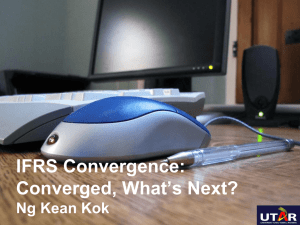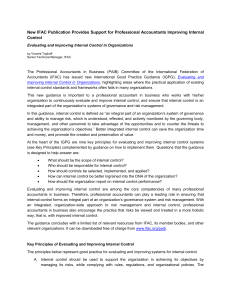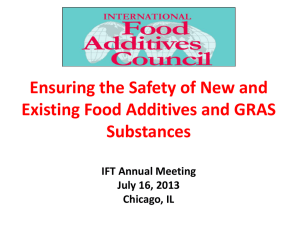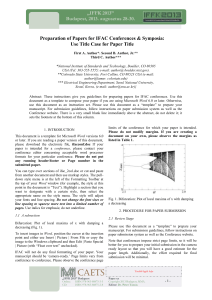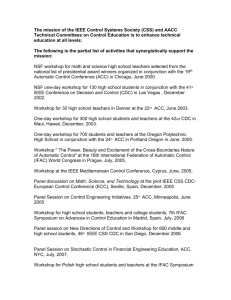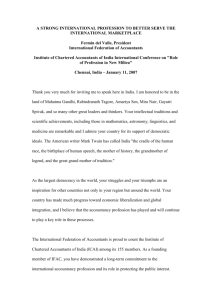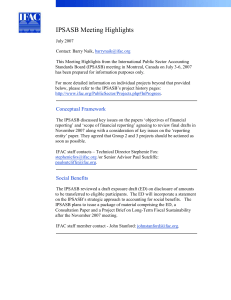International Federation of Automatic Control
advertisement
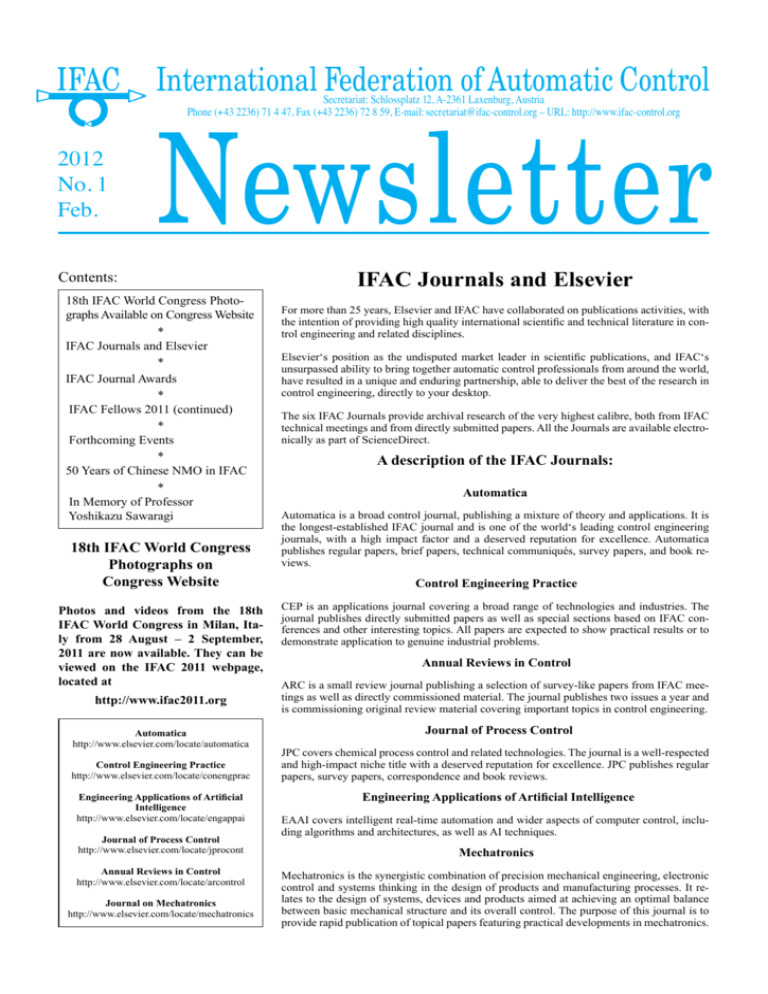
International Federation of Automatic Control Secretariat: Schlossplatz 12, A-2361 Laxenburg, Austria Phone (+43 2236) 71 4 47, Fax (+43 2236) 72 8 59, E-mail: secretariat@ifac-control.org – URL: http://www.ifac-control.org 2012 No. 1 Feb. Newsletter IFAC Journals and Elsevier Contents: 18th IFAC World Congress Photographs Available on Congress Website * IFAC Journals and Elsevier * IFAC Journal Awards * IFAC Fellows 2011 (continued) * Forthcoming Events * 50 Years of Chinese NMO in IFAC * In Memory of Professor Yoshikazu Sawaragi 18th IFAC World Congress Photographs on Congress Website Photos and videos from the 18th IFAC World Congress in Milan, Italy from 28 August – 2 September, 2011 are now available. They can be viewed on the IFAC 2011 webpage, located at http://www.ifac2011.org Automatica http://www.elsevier.com/locate/automatica Control Engineering Practice http://www.elsevier.com/locate/conengprac Engineering Applications of Artificial Intelligence http://www.elsevier.com/locate/engappai Journal of Process Control http://www.elsevier.com/locate/jprocont Annual Reviews in Control http://www.elsevier.com/locate/arcontrol Journal on Mechatronics http://www.elsevier.com/locate/mechatronics For more than 25 years, Elsevier and IFAC have collaborated on publications activities, with the intention of providing high quality international scientific and technical literature in control engineering and related disciplines. Elsevier‘s position as the undisputed market leader in scientific publications, and IFAC‘s unsurpassed ability to bring together automatic control professionals from around the world, have resulted in a unique and enduring partnership, able to deliver the best of the research in control engineering, directly to your desktop. The six IFAC Journals provide archival research of the very highest calibre, both from IFAC technical meetings and from directly submitted papers. All the Journals are available electronically as part of ScienceDirect. A description of the IFAC Journals: Automatica Automatica is a broad control journal, publishing a mixture of theory and applications. It is the longest-established IFAC journal and is one of the world‘s leading control engineering journals, with a high impact factor and a deserved reputation for excellence. Automatica publishes regular papers, brief papers, technical communiqués, survey papers, and book reviews. Control Engineering Practice CEP is an applications journal covering a broad range of technologies and industries. The journal publishes directly submitted papers as well as special sections based on IFAC conferences and other interesting topics. All papers are expected to show practical results or to demonstrate application to genuine industrial problems. Annual Reviews in Control ARC is a small review journal publishing a selection of survey-like papers from IFAC meetings as well as directly commissioned material. The journal publishes two issues a year and is commissioning original review material covering important topics in control engineering. Journal of Process Control JPC covers chemical process control and related technologies. The journal is a well-respected and high-impact niche title with a deserved reputation for excellence. JPC publishes regular papers, survey papers, correspondence and book reviews. Engineering Applications of Artificial Intelligence EAAI covers intelligent real-time automation and wider aspects of computer control, including algorithms and architectures, as well as AI techniques. Mechatronics Mechatronics is the synergistic combination of precision mechanical engineering, electronic control and systems thinking in the design of products and manufacturing processes. It relates to the design of systems, devices and products aimed at achieving an optimal balance between basic mechanical structure and its overall control. The purpose of this journal is to provide rapid publication of topical papers featuring practical developments in mechatronics. IFAC Journals Best Papers Awards At each IFAC World Congress the Journals of IFAC award prizes for those papers that have been deemed to be making an outstanding contribution to the area covered by the scope of the Journal. These prizes are selected by the Editors and Editorial boards of the Journals from amongst those papers published in the previous triennium and funded by the IFAC Publisher, Elsevier Ltd. 2011 IFAC Fellows In this Newsletter we continue introducing the IFAC Fellows Reza Moheimani The papers presented below are the winners of the various paper prizes from the triennium that concluded with the 18th IFAC World Congress which took place in Milan, Italy from August 28 – September 2, 2011. Automatica Survey Prize: A unifying point of view on output feedback designs for global asymptotic stabilization Vol. 45 Issue 8, pp. 1789-1798, 2009, by Vincent Andrieu and Laurent Praly, France Theory/Methodology Prize: Controllability and observability of Boolean control networks Vol. 45 Issue 7, pp. 1659-1667, 2009 by Daizhan Cheng and Hongsheng Qi, China, P.R. Applications Prize: Continuous trajectory planning of mobile sensors for informative forecasting Vol. 46 Issue 8, pp. 1266-1275, 2010 Han-Lim Choi (Korea), Jonathan P. How (USA) Control Engineering Practice Design, tuning, and evaluation of a full-range adaptive cruise control system with collision avoidance Vol. 17, Issue 4, pp. 442-455, 2009 Seungwuk Moon, Ilki Moon, Kyongsu Yi (Korea, Rep.) On optimal motorcycle braking Vol. 16, Issue 6, pp. 644-657, 2008 Matteo Corno, Sergio Matteo Savaresi, Mara Tanelli, Luca Fabbri (Italy) Tuning and auto-tuning of fractional order controllers for industry applications Vol. 16, Issue 7, pp. 798-812, 2008 Concepción A. Monje, Blas Vinagre, Vicente Feliu (all Spain), YangQuan Chen (USA) Engineering Applications of AI Theory Prize: Two coding based adaptive parallel co-genetic algorithm with double agents structure Vol. 23, Issue 4, pp. 526–542, 2010 Yongming Li, Xiaoping Zeng, Liang Han, Pin Wang (China, P.R.) Application Prize: Pareto optimization of a five-degree of freedom vehicle vibration model using a multi-objective uniform-diversity genetic algorithm (MUGA) Vol. 23, Issue 4, pp. 543–551, 2010 N. Nariman-Zadeh, M.Salehpour, A.Jamali, E. Haghgoo (Iran) Mechatronics A practical approach to the design and control of active endoscopes Vol. 20, Issue 2, pp. 251–264, 2010 Vincent De Sars, Sinan Haliyo, Jerome Szewczy (France) Design and input-shaping control of a novel scanner for high-speed atomic force microscopy Vol. 18, Issues 5-6, pp. 282–288, 2008 Georg Schitter (Austria), Philipp J. Thurner, Paul K. Hansma (both USA) A miniature milling spindle with Active Magnetic Bearings Vol. 20, Issue 2, pp. 224–235, 2010 Maarten H. Kimman, H.H. Langen, R.H. Munnig Schmidt (Netherlands) Journal of Process Control Survey Paper Prize: Survey on iterative learning control, repetitive control, and run-to-run control Vol. 19, Issue 10, pp. 1589-1600, 2009 Youqing Wang (USA), Furong Gao (Hong Kong), Francis J. Doyle III (USA) Applications Paper Prize: Feedback control and optimization for the production of commercial fuels by blending Vol. 20, Issue 4, pp. 441-451, 2010 M. Chèbre, Y. Creff, N. Petit (France) Theory Paper Prize: Integration of real-time optimization and model predictive control Vol. 20, Issue 2, pp. 125-133, 2010 Veronica Adetola, Martin Guay (Canada) Georg Schitter (Austria), left, Chris Greenwell (UK), right S. O. Reza Moheimani received a BSc degree in Electrical and Electronics Engineering from Shiraz University, Iran in 1990. He then moved to Australia and completed a MEngSc and a Ph.D. in electrical engineering at the University of New South Wales in 1993 (at UNSW‘s Kensington Campus, in Sydney) and 1996 (at UNSW‘s Australian Defence Force Academy Campus in Canberra), respectively. Following completion of his Ph.D. he was a postdoctoral research fellow at the Australian Defence Force Academy, Canberra, Australia. In 1997 he took up an academic position at the University of Newcastle, where he is currently a Professor and an Australian Research Council Future Fellow in the School of Electrical Engineering and Computer Science. He founded, and directs, the Laboratory for Dynamics and Control of Nanosystems, a multi-million-dollar state-ofthe-art research facility dedicated to the advancement of nanotechnology through innovations in systems theory and control engineering. From 2003 - 2010 he served as the Associate Director of Centre for Complex Dynamic Systems and Control (CDSC), an Australian Research Council Centre of Excellence. His research has ranged across many areas including robust control theory and robust state estimation of uncertain dynamic systems, applications of control and estimation in nanoscale positioning systems for high-speed scanning probe microscopy, smart structures, active control of noise and vibration, mechatronics and applications of control in microlectromechanical systems (MEMS) and in emerging data storage systems, in which he has published over 200 articles in scientific journals and conference proceedings, as well as several books and edited volumes. He has served on the editorial boards of a number of journals, including IEEE Transactions on Control Systems Technology, IEEE/ASME Transactions on Mechatronics, Control Engineering Practice and International Journal of Control, Automation and Systems. He has contributed to the organization of and has chaired several international conferences and workshops. He is a recipient of the 2007 IEEE Transactions on Control Systems Technology Outstanding Paper Award and the 2009 IEEE Control Systems Technology Award, together with a group of researchers from IBM Zurich Research Labs, where he held several visiting appointments. He is a Fellow of IEEE, a Fellow of IFAC and a Fellow of the Institute of Physics (UK). 2011 IFAC Fellows (continued) Jie Chen He currently serves as the founding Editor-inChief for the Journal of Control Science and Engineering, and a Guest Editor for the IEEE Control Systems Magazine. In addition, he served on program committees for numerous international conferences in the systems and control area, including the IFAC Symposium on System Identification and Parameter Estimation, the IEEE Conference on Decision and Control, the IEEE Conference on Control Applications, and American Control Conference. He has been a member of the IFAC Technical Committee on Modeling, Identification and Signal Processing since 1994, and a member of the IFAC Technical Committee on Linear Control Systems since 2002. Edgar H. Bristol Jie Chen teaches at the University of California, Riverside (USA) in the field of systems and control, and signal processing. He was born in Yichun, Jiangxi Province, People‘s Republic of China on January 14, 1963. He received the B.S. degree in aerospace engineering from Northwestern Polytechnic University, Xian, China in 1982, the M.S.E. degree in electrical engineering, the M.A. degree in mathematics, and the Ph.D. degree in electrical engineering, all from the University of Michigan, Ann Arbor, Michigan, in 1985, 1987, and 1990, respectively. From 1990 to 1993, he was with the School of Aerospace Engineering and the School of Electrical and Computer Engineering at the Georgia Institute of Technology, Atlanta, Georgia. He joined the University of California, Riverside, as an Assistant Professor in 1994, where he became an Associate Professor in the Department of Electrical Engineering in 1997, a Professor in 1999, and served as Professor and Department Chair from 2001 to 2006. He has held guest positions and visiting appointments with Northwestern Polytechnic University, Xian, Zhejiang University, Hangzhou, Dalian University of Technology, Dalian, Harbin Institute of Technology-Shenzhen Graduate School, Shenzhen, Hong Kong University of Science and Technology, Hong Kong, China; Tokyo Institute of Technology, Tokyo, Japan; the University of Tokyo Institute of Technology, Tokyo, Japan; the University of Newcastle, Callaghan, the University of Western Sydney, Penrith, Australia. His main research interests are in the areas of networked control, linear multivariable systems theory, system identification, robust control, optimization, and signal processing. He is the author of two books, respectively, (with G. Gu) ControlOriented System Identification: An H-infinity Approach (Wiley-Interscience, 2000), and (with K. Gu and V.L. Kharitonov) Stability of Time-Delay Systems (Birkhauser, 2003). Dr. Chen is a recipient of the 1996 US National Science Foundation CAREER Award, of 2004 SICE International Award, and of 2006 Natural Science Foundation of China Outstanding Overseas Young Scholar Award. He was a past Associate Editor for Automatica, IEEE Transactions on Automatic Control, Journal of Control Theory and Applications, and a past Guest Editor for the IEEE Transactions on Automatic Control. 50 Years of Chinese NMO in IFAC Beijing, China 27 - 29 November, 2011 CAA (Chinese Association of Automation) recently celebrated its 50th anniversary as an IFAC NMO in conjunction with the biannual Chinese Automation Congress 2011 (CAC 2011), which was recently held in Beijing, China from 27-29 November. CAC 2011 consisted of ten keynote speeches, seven symposia, and more than 70 oral presentations and attracted around 1000 participants. 800 papers were received and 400 were accepted for presentation. Invited speakers from IFAC included Professor Karl Johann Astrom of Lund University, Sweden, and Professor Tamer Basar from the University of Illinois, USA. Impressum: Medieninhaber und Herausgeber: International Federation of Automatic Control (IFAC), Zurich Schlossplatz 12, A-2361 Laxenburg, Austria Verlagsort und Redaktion: Univ.Prof. Dr. tech. K. Schlacher, Schlossplatz 12, A-2361 Laxenburg Hersteller: Artur Schefczik & Sohn August-Reuss-Gasse, A-1130 Wien Edgar H. (Ed) Bristol is a graduate of MIT and Beloit College in Electrical Engineering and Mathematics, with some forty years at the Foxboro Co./Invensys. “I’m now resisting retirement!” says Bristol. He is a well known process control author with some 100 papers and dozen patents in control, adaptive control, multivariable control, and control software and languages. He has participated in a number of Process Control Standards efforts dating back to the beginning of the Purdue Workshop. He is the originator of RGA analysis and pattern recognition-based adaptive control, for which he received the initial IEEE Control Technology Award and similar AIChE and ISA awards. He is also the 2003 recipient of the ACC Control Technology Award, listed as one of the 50 most influential industry innovators. He is currently a fellow of the ISA, and a current or past member of the IEEE, AIChE, ACM, and MAA, and listed nationally and locally in a number of groups within these organizations. Outside of professional life Bristol enjoys biking/ bike touring and growing orchids and rhododendrons. Editor: Kurt Schlacher Layout: Elske Haberl published bimonthly Offenlegung: Das Medienwerk ‘IFAC Newsletter’ wird als Organ der ‘International Federation of Automatic Control’ (IFAC) verlegt und ist Eigentum dieser Internationalen Föderation, deren Tätigkeit der Förderung von Wissenschaft und Technik automatischer Regelung und Steuerung dient. Die Föderation hat ihren Sitz in Zürich und ist nach Schweizer Recht als gemeinnütziger Verein angemeldet. Sie verfolgt weder wirtschaftliche noch praktische Ziele. Das Sekretariat der IFAC befindet sich seit 1978 aufgrund eines Übereinkommens mit der Österreichischen Bundesregierung mit der Österreichischen Akademie der Wissenschaften in Laxenburg. Der ‘IFAC Newsletter’ erscheint sechsmal jährlich in englischer Sprache unter der Redaktion des Generalsekretärs der IFAC, Univ.Professor Kurt Schlacher. Die Zeitschrift dient der Information über die Aktivitäten der IFAC. Sie wird kostenlos an Abonnenten in 50 Länder versandt. Die Kosten werden von der IFAC aus Beiträgen der derzeit 52 Mitgliedsländer getragen. Präsident der IFAC für 2011-2014 ist Prof. Ian Craig (Südafrika), Vizepräsidenten sind Prof. Iven Mareels (Australien) und Prof. Roger Goodall (Grossbritannien). Alle Funktionen werden ehrenamtlich ausgeübt. (To our readers: To comply with the Austrian ‘Media Act’, every publication must contain a declaration once a year concerning ownership and purpose, as above.) In Memory of Yoshikazu Sawaragi 19 December, 1916 – 22 October, 2011 Japan, and was Chair of IFAC NMO Japan until 1981. Professor Sawaragi attended the first international Automatic Control Conference, held in Heidelberg, September 1956, to present a paper entitled: Spectral response of control systems containing zero-memory nonlinearity to random inputs. Then, he attended the first IFAC Moscow Congress. Ever since, he consecutively attended World Congresses until the 14th IFAC World Congress, Beijing in 1999. He became IFAC President in 1978, and successfully organized the 8th IFAC World Congress in Kyoto 1981. It is my sad duty to inform the IFAC community that former IFAC President Professor Yoshikazu Sawaragi passed away at the age of 94 in Kyoto, Japan on Saturday, 22 October, 2011. As a scientist and an organizer in the field of control engineering and system sciences, he made a great contribution in nonlinear forced vibrations, statistical analysis of nonlinear control systems, modern control theory and its applications, and system sciences with applications to environmental pollution control. He has been a distinguished leader of the Japanese control community after World War II, who also made tremendous contributions to IFAC as President and IFAC advisor since 1984, and received the outstanding service award in 1990 and became an IFAC Fellow in 2005. Yoshikazu Sawaragi was born on 19 December, 1916 in Kyoto, Japan. He graduated from the Department of Mechanical Engineering, Kyoto Imperial University in 1939, and joined the Faculty of Engineering, Nagoya Imperial University in 1941, and moved to the Faculty of Engineering, Kyoto University in 1947, and was promoted to full professor of the Faculty of Engineering, Kyoto University in 1950. Recognizing the importance of automatic control as a key technology in Japan, he organized a research committee of automatic control in the Faculty of Engineering, Kyoto University in 1952. He also played a major role to launch a new Department of Applied Mathematics and Physics, Faculty of Engineering, Kyoto University in 1959 to educate students in new areas of applied mathematics, control theory, computer, operations research, and applied physics. At the same time, he established the Research Institute of Automatic Control, Faculty of Engineering to promote applied researches in automatic control, including process control and servomechanisms. He has supervised a large number of doctoral students in Faculty of Engineering, Kyoto University. He played an important role in establishing the Association of Automatic Control Engineers, Japan (presently, Institute of Systems, Control and Information Engineers) in Kyoto 1957, and he was President of this Association from 1971 to 1976. From 1987 to 1989, he also served as President of the Society of Instrument of Control Engineers established in Tokyo 1961. In 1969 he became Member of the Science Council of IFAC Fellows 2011 (continued) This concludes the series of introductions of the 2011 IFAC Fellows Panagiotis Christofides His research interests have moved from control engineering to system sciences, including complex systems and environmental systems. He was the principal investigator of Research Projects for Environmental Pollution Control from 1972 to 1974, and for Detection and Control of Environmental Pollution from 1974 to 1976, supported by the Ministry of Education, Japan. He was also interested in the multicriteria optimization theory and its applications in engineering and environmental problems, and he started collaboration with IIASA in the mid 1970s. After retirement from Kyoto University, he established the Japan Institute of Systems Research (JISR) in 1980, and organized and supervised various applied research projects between academia and industry. Especially, he started a joint program between JISR and IIASA in 1987 on the development of interactive modeling and decision support systems. This shows that he willingly moved to difficult and challenging areas of research, indicating his high intelligence, vision and creativity. He told us that his basic idea for complex nonlinear systems was inspired by a booklet by Theodore von Kármán, “The engineer grapples with nonlinear problems”, which he read when he started studies on nonlinear vibration in the 1940s. In 2004, he established his Engineering Institute to disseminate his “Shinayaka” Systems Approach and apply it to various engineering problems. For his outstanding contributions to Systems and Control Engineering, he received the Medal with Purple Ribbon in 1980, and the Second Class Order of Sacred Treasure in 1988, and Kyoto Prefecture Culture Achievement Award in 1994. All of us who knew him will remember and miss him as a distinguished scientist, teacher, and the kindest and thoughtful man. We believe that he is playing his favorite golf in the heaven. Tohru Katayama Emeritus Professor Kyoto University Member of IFAC Executive Board This Newsletter may be reproduced in whole or in part. We encourage reprinting in national and local automatic control periodicals. Acknowledgement to IFAC would be appreciated. Paniogiotis D. Christofides received the diploma in chemical engineering degree in 1992 from the University of Patras (Greece), the M.S. degrees in electrical engineering and mathematics in 1995 and 1996, respectively, and the Ph. D. degree in chemical engineering in 1996, all from the University of Minnesota (USA.) Since 1996 Professor Christofides has been with the University of California – Los Angeles (UCLA), where he is currently a professor in the Department of Chemical and Biomedical Engineering, as well as the Department of Electrical Engineering. His theoretical research interests include nonlinear and predictive control, and analysis and control of distributed parameter systems, multiscale systems and hybrid systems, with applications to chemical processes, advanced materials processing, particulate processes, and water systems. His research work has resulted in a large number of articles in leading scientific journals and conference proceedings and five books. Prof. Christofides has received several awards for his teaching and research work, including the Teaching Award from the AIChE Student Chapter of UCLA in 1997, a Research Initiation Grant from the ACS-Petroleum Research Fund in 1998, a CAREER award from the National Science Foundation in 1998, The Ted Peterson Student Paper Award and the Outstanding Young Researcher Award from the Computing and Systems Technology Division of AIChE in 1999 and 2008, respectively, and a Young Investigator Award from the Office of Naval Research in 2001. He has won the Donald P. Eckman Award in 2004 and also twice received the O. Hugo Schuck Best Paper Award in 2000 and 2004, all from the American Automatic Control Council. He is an IEEE Fellow. FORTHCOMING EVENTS 2012 No. 1 Feb. Title 2012 Place Further Information IFAC Workshop Embedded Guidance, Navigation and Control in Aerospace February 13 – 15 Bangalore India http://www.ifac-egnca.org/ e-mail: EGNCA2012@aero.iisc.ernet.in 7th Conference on Mathematical Modelling MATHMOD 2012 February 15 – 17 Vienna Austria http://www.mathmod.at/ 6th IFIP/IFAC. Conference Interoperability for Enterprise Systems and Applications – I-ESA’12 March 22 – 23 Valencia Spain http://www.aidima.es/iesa2012/ e-mail: info@i-esa.org IFAC Conference Advances in PID Control March 28 – 30 Brescia Italy http://pid12.ing.unibs.it e-mail: pid12@ing.unibs.it IFAC Conference April Embedded Systems, Computational 03 – 05 Intelligence and Telematics in Control - CESCIT Wuerzburg Germany http://:www7.informatik.uni-wuerzburg.de/cescit e-mail: not yet available IFAC Workshop Navigation, Guidance and Control of Underwater Vehicles (NGCUV’2012) April 10 – 12 Porto Portugal http://paginas.fe.up.pt/~ngcuv2012/ e-mail: ngcuv2012@fe.up.pt IFAC Symposium Information Control Problems in Manufacturing – INCOM 2012 May 23 – 25 Bucharest Romania http://www.incom12.ro e-mail: incom12@cimr.pub.ro IFAC Conference Programmable Devices and Embedded Systems – PdeS 2012 May 23 – 26 Brno Czech Rep. http://www.pdes2012.feec.vutbr.cz/ e-mail: pdes2012@feec.vutbr.cz IFAC Workshop Automatic Control in Offshore Oil and Gas Production May 31 – June 1 Trondheim Norway http://www.ifac-oilfield.no/ IFAC Conference Analysis and Design of Hybrid Systems - ADHS 2012 June 06 – 08 Eindhoven Netherlands http://adhs12.org/ e-mail: info@adhs12.org IFAC Conference International Stability and Systems Engineering: - SWIIS 2012 June 11 – 13 Waterford Ireland http:// not yet available e-mail: not yet available IFAC Workshop Dynamics and Control in Agriculture and Food Processing – DYCAF June 13 – 16 Plovdiv Bulgaria http://dycaf-2012.tu-plovdiv.bg e-mail: altaneva@tu-plovdiv.bg IFAC Symposium Advances in Control Education - ACE 2012 June 19 – 21 Nizhny Novgorod Russia http://ace2012.ru/ e-mail: ifac.ace2012@gmail.com IFAC Symposium Robust Control Design – ROCOND June 20 – 22 Aalborg Denmark http://www.rocond12.org/ IFAC Conference Analysis and Control of Chaotic Systems - CHAOS 12 June 20 – 22 Cancun Mexico http://www.ipicyt.edu.mx/Chaos12/chaos12.html e-mail: not yet available IFAC Workshop Time Delay Systems (IFAC-TDS-2012) June 22 – 24 Boston MA, USA http://www.coe.neu.edu/IFACTDS2012/main.htm e-mail: not yet available American Control Conference - in cooperation with IFAC - IFAC Symposium Advanced Control of Chemical Processes - ADCHEM-2012 June 27 – 29 Montreal Canada http://a2c2.org/conferences/acc2012/index.php July 10 – 13 Singapore Singapore http://www.adchem2012.org/ e-mail: ivan@adchem2012.org IFAC Symposium System Identification – SYSID 2012 July 11 – 13 Brussels Belgium http://www.sysid2012.org/ e-mail: secretariat@sysid2012.org INSTICC/IFAC 9th Int. Conference Informatics in Control, Automation and Robotics – ICINCO 2012 July 28 – 31 Rome Italy http://icinco.org e-mail: icinco.secretariat@insticc.org IFAC Conference Nonlinear Model Predictive Control August 23 – 27 Noordwijkerhout NL http:// not yet available e-mail: not yet available 17th Intl. Conference (cosponsored by IFAC) Methods and Models in Automation and Robotics – MMAR 2012 August 27 – 30 Miedzyzdroje Poland http:// not yet available e-mail: not yet available FORTHCOMING EVENTS (ctd.) IFAC Symposium Fault Detection, Supervision and Safety for Technical Processes – SAFEPROCESS August 29 – 31 Mexico City Mexico http://safeprocess2012.unam.mx/ e-mail: SafeProcess12@iingen.unam.mx IFAC Workshop Modelling and Control in Biomedical Systems – BMS 2012 August 29 – 31 Budapest Hungary http://bms.iit.bme.hu/ e-mail: bms@iit.bme.hu IFAC Symposium Power Plants and Power Systems Control September 02 – 05 Toulouse France http://www.pppswc2012.org e-mail: not yet available IFAC Symposium Robot Control – SYROCO 2012 September 05 – 09 Dubrovnik Croatia http://www.syroco2012.org/ e-mail: syroco2012@syroco2012.org KSAE/IFAC Symposium Advanced Vehicle Control - AVEC 12 September 09 – 12 Seoul Korea http://avec12.ksae.org/ e-mail: avec12@ksae.org IFAC Workshop Automation in Mining, Mineral and Metal Industries September 10 – 12 Gifu Japan http://www.ifacmmm2012.org e-mail: info@ifacmmm2012.org IFAC Symposium Control in Transportation Systems – CTS’12 September 12 – 14 Sofia Bulgaria http://hs27.iccs.bas.bg/ IFAC Workshop Control Applications of Optimization - CAO’12 September 13 – 16 Rimini Italy http://cao2012.imm.uran.ru e-mail: not yet available IFAC Symposium Manoeuvring and Control of Marine Craft - MCMC’2012 September 19 – 21 Arenzano Italy www.mcmc2012.issia.cnr.it IFAC Workshop Generalized Statements and Solutions of Control Problems - GSSCP September 24 – 30 Gelendzhik Russia http:// not yet available e-mail: not yet available IFAC Workshop Discrete Event Systems – WODES October 01 – 03 Guadalajara Mexico http://www.gdl.cinvestav.mx/wodes-12 e-mail: wodes2012@gdl.cinvestav.mx IFAC Workshop Discrete Event System Design – DeSD October 01 – 04 Campos do Jordao Brazil http://www.desdes.uz.zgora.pl e-mail. DESDes@iie.uz.zgora.pl IFAC Workshop Multi Vehicle Systems – MVS October 03 – 05 Espoo Finland http:// mvs2012.aalto.fi/ e-mail: mvs2012@aalto.fi IFAC Workshop on Engine and Powertrain Control Simulation and Modelling Latin American Control Conference – LACC in cooperation with IFAC October 23 – 25 Paris France http://www.ecosm12.org October 23 – 26 Lima Peru http://congreso.pucp.edu.pe/clca-2012/ IFAC Workshop November Seville http://www.amest_2012.com/ Maintenance for Dependability, 22 – 23 Spain (not yet operative) Asset Management and PHM - A-MEST Title 2013 Place Further Information IFAC Symposium February Grenoble http:// not yet available System Structure and Control 04 – 06 France e-mail: not yet available IFAC Symposium Mechatronic Systems April 10 – 12 Hangzhou China http:// not yet available e-mail: not yet available IFAC/(IFIP/IFROS/IEA) Symposium Analysis, Design, and Evaluation of Human-Machine Systems – HMS 2013 August 11 – 15 Las Vegas ÛSA http://not yet available e-mail: not yet available IFAC Symposium Advances in Control Education - ACE 201 August 28 – 30 Sheffield UK http://ace2013.group.shef.ac.uk/ e-mail: not yet available IFAC Symposium Automatic Control in Aerospace - ACA 2013 September 02 – 06 Wuerzburg Germany http://www7.informatik.uni-wuerzburg.de/aca2013 e-mail: aca2013@informatik.uni-wuerzburg.de IFAC Symposium Nonlinear Control Systems - NOLCOS September 04 – 06 Toulouse France http:// not yet available e-mail: not yet available IFAC Conference Management and Control of Production and Logistics – MCPL 2013 September 12 – 14 Fortaleza Brazil http:// not yet available e-mail: not yet availalbe Title 2014 Place Further Information 19th IFAC World Congress August 25 – 29 Cape Town South Africa http://www.ifac2014.org/ email: not yet available
